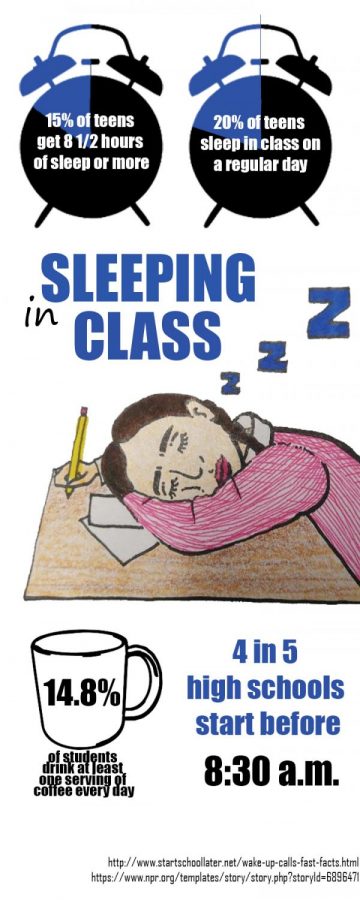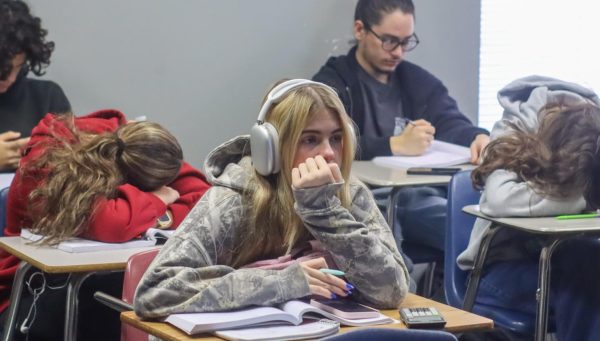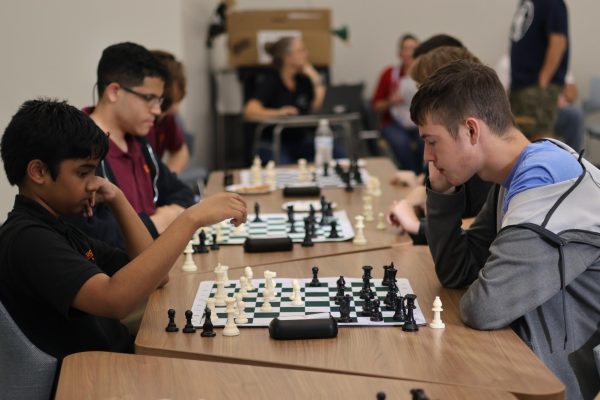Dreaming of a good night’s sleep
The stereotype of a student drifting sleeping as they sit in the back of the class may seem exaggerated, but for many students, nodding off in class is a reality. Whether lured to sleep by a warm classroom, chronic sleep deprivation, or a monotonous lesson, some students have trouble keeping their eyes open for a whole day of classes.
Some of this sleepiness may be caused by sleeping habits of modern teenagers. According to the National Sleep Foundation’s website, only 15 percent of teens report sleeping eight and a half hours on school nights. The same website declares that teens need between 8 and 10 hours of sleep to function at their best. Sleep deprivation caused by the differences in these numbers may be responsible for the napping that some students find necessary during class.
“Its obviously natural for students to fall asleep in class if they stayed up into the wee hours of the morning doing homework,” junior Cassidy Smith said.
Another possible cause may be the attention span of students. For many, boredom can cause sleepiness, and long classes can be the cause of boredom. According to child psychologists, the average attention span of children and adolescents ranges from two times their age to five times their age. This means that a fifteen year old freshman’s attention span ranges from only half an hour to 75 minutes. Even for the most mature of seniors, that only come to 90 minutes. On block days, classes last 100 minutes, longer than even the most optimistic , tolling on the weak attention spans of adolescents.
“What you’re learning is important, and you have to pay attention to it whether you want to or not.” junior Shannon Pitts said.
When these factors combine, they can form the ideal environment for an afternoon nap. Often, students are sleepiest just after lunch, when their stomachs are recently filled and they are prone to bouts of sleepiness. Another common time for sleeping students is when teachers put videos on in the classroom. Smith, for example, fell asleep in her Human geography class when her teacher put on a video, and was faced with the wrath of her teacher when she awoke.
“I never fell asleep in that class again.”Smith said. “I didn’t want to get in trouble.”
For some students, the allure of sleep comes almost constantly. Sleeping in class, rather than an occasional distraction, becomes a constant problem that can affect grades, performance and self esteem.
“I try really hard to stay awake, but I just can’t keep my eyes open,” junior Nancy Chen said.
For these students, strategies can help them stay awake. Some use simple tricks like snapping a rubber band on their wrist, while other resort to more drastic changes in behavior. The pathological consumption of caffeine in the form of coffee can help alleviate the need for sleep in class. Other methods, like splashing water on the face can do the same without chemical help, but may be less effective.
“I’ve tried splashing water on my face, but it doesn’t seem to work.” Chen said. “I haven’t really tried drinking coffee, but from what I know from the few times I have drank it, I don’t think it would work either.”
Your donation will support the student journalists of Hagerty High School. Your contribution helps us publish six issues of the BluePrint and cover our annual website hosting costs. Thank you so much!







